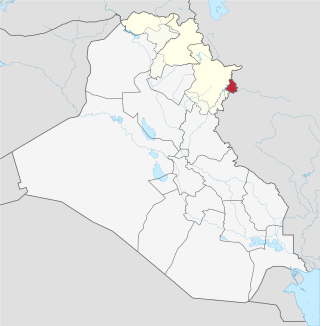
Nechirvan Idris Barzani is a Kurdish politician serving as the second President of the Kurdistan Region. He was elected into office by the Kurdistan Region Parliament in June 2019. Nechirvan Barzani was appointed as Vice President of the Kurdistan Democratic Party since 2010. He previously served as Prime Minister of the Kurdistan Regional Government from March 2007 to August 2009 and March 2012 to May 2019. Nechirvan Barzani is also the founder of the University Of Kurdistan Hewlêr, the region's top ranking university located in Erbil. His rule combines aspects of Kurdish nationalism, national conservatism, economic liberalism, modernism and reforms, reforms in agriculture and women's rights.

The Ilısu Dam is a concrete-face rock-fill dam on the Tigris near the village of Ilısu and along the border of Mardin and Şırnak Provinces in Turkey. It is one of the 22 dams of the Southeastern Anatolia Project and its purpose is hydroelectric power production, flood control and water storage. When operational, the dam will support a 1,200 MW power station and will form a 10.4 billion m3 reservoir. Construction of the dam began in 2006 and was originally expected to be completed by 2016. As part of the project, the much smaller Cizre Dam is to be constructed downstream for irrigation and power. The dam has drawn international controversy, because it will flood portions of ancient Hasankeyf and necessitate the relocation of people living in the region. Because of this, the dam lost international funding in 2008. Most historical structures in Hasankeyf were moved to the new Hasankeyf prior to the filling of the dam. The dam began to fill its reservoir in late July 2019. Due to rainfall, the dam has achieved water levels up to 100m above the river bed and stored 5 billion cubic meters of water. The water level had reached an elevation of 498.2m on 1 April 2020.
The Baihetan Dam is a large hydroelectric dam on the Jinsha River, an upper stretch of the Yangtze River in Sichuan and Yunnan provinces, in southwest China. The dam is a 289-meter-tall double-curvature arch dam with a crest elevation of 827 m, and a width of 72 m at the base and 13 m at the crest. It is considered to be the last large hydropower project in China after a series of projects starting with the Three Gorges Dam. It is also the second largest hydropower plant in the world. The hydropower station is equipped with 16 hydro-generating units each having a capacity of 1 million kilowatts, the world's largest turbines. All hydro-generating units of the Baihetan hydropower station became fully operational on 20 December 2022.

Masrour Barzani is a Kurdish politician and serving as prime minister of the Kurdistan Region, an autonomous region in Iraq, since June 2019. He is also the chancellor of the Kurdistan Region Security Council and a member of the Kurdistan Democratic Party. He was sworn in as prime minister of the KRG’s ninth cabinet on 10 June 2019, after receiving 87 votes out of 97 legislators in the Kurdistan parliament.

The Darbandikhan Dam is a multi-purpose embankment dam on the Diyala River in northern Sulaymaniyah Governorate, Iraq. It was constructed between 1956 and 1961. The purpose of the dam is irrigation, flood control, hydroelectric power production and recreation. Due to poor construction and neglect, the dam and its 249 MW power station have undergone several repairs over the years. A rehabilitation of the power station began in 2007 and was completed in 2013.
The Bekhme Dam is an unfinished multi-purpose rock-fill dam on the Great Zab 60 kilometres (37 mi) northeast of Erbil, in the Erbil Governorate of Kurdistan Region, Iraq.
Ayago Hydroelectric Power Station, also Ayago Power Station, is a planned 840 megawatt hydroelectric power project to be constructed in Uganda. If it is built, Ayago would be the largest power station in Uganda, based on generating capacity.
The 2011 Kurdish protests in Iraq were a series of demonstrations and riots against the Kurdistan Regional Government in Iraqi Kurdistan. The autonomous region experienced protests that were concurrent with the 2011 Iraqi protests and the wider Arab Spring. The Iraqi Kurdish protests were also related to the 2011 Kurdish protests in Turkey and the 2011–2012 Iranian protests, as well as the civil uprising phase of the Syrian Civil War.
The Çetin Dam hydropower dam, on the Botan River in Siirt Province, Turkey, with an installed capacity of 420 MW. It was completed in 2020.

Relations of Kurdistan Region of Iraq with foreign states and organizations are conducted by the Kurdistan Region. Political stability and a rapidly developing economy have given the KRG the opportunity to pursue a foreign policy independent from the federal government's. The KRG's primary body for directing its foreign affairs is the Department of Foreign Relations (DFR). The DFR's foremost objectives are to raise the global profile of the Kurdistan Region, improve the Region's international ties with various governments and international organizations, and present emerging business opportunities in the Kurdistan Region to regional and international actors.

Rudaw Media Network, is a major media broadcaster in the Kurdistan Region, Iraq.

Halabja Governorate is a governorate in the semi-autonomous region of Kurdistan Region in Iraq. The governorate was established in 2014, splitting off from Sulaymaniyah Governorate and becoming the fourth governorate in the Kurdistan Region of Iraq. Its capital is the city of Halabja. Halabja Governorate is the least populated governorate.
The Dasu Dam is a large hydroelectric gravity dam currently under construction on the Indus River near Dasu in Kohistan District, Khyber Pakhtunkhwa Province, Pakistan. It is developed by Pakistan Water and Power Development Authority (Wapda), as a key component of the company's Water Vision 2025. The project was started in 2019 but faced a delay due to funds and land acquisition disputes. Work resumed in 2020 after land acquisition and arrangements of funding facility, the World Bank agreed to contribute $700 million of the $4.2 billion as the government of Imran Khan decided to proceed ahead with the construction of the project, as part of the WAPDAs vision 2025.

An independence referendum for the Kurdistan Region of Iraq was held on 25 September 2017, with preliminary results showing approximately 92.73 percent of votes cast in favour of independence. Despite reporting that the independence referendum would be non-binding, the autonomous Kurdistan Regional Government (KRG) characterised it as binding, although they claimed that an affirmative result would trigger the start of state building and negotiations with Iraq rather than an immediate declaration of independence of Kurdistan. The referendum's legality was rejected by the federal government of Iraq.

Kurdistan 24 (K24) is a Kurdish broadcast news station based in Erbil, Kurdistan, with foreign bureaus in Washington, DC. The service was launched on 31 October 2015. Noreldin Waisy is the founder and former general manager of Kurdistan 24.

Hungary–Kurdistan Region relations are bilateral relations between Hungary and the Kurdistan Region. Hungary is represented in Kurdistan Region through a consulate general since November 2014, while Kurdistan Region has no representation in Hungary. Relations are characterized by several high-level talks and close ties. The Kurdish President Massoud Barzani visited Hungary in 2012 and in 2015 on official visits. Moreover, Hungarian Prime Minister Viktor Orbán uttered support for the independence of Kurdistan Region from Iraq in 2015 causing concern among the Islamic Supreme Council of Iraq.

Italy–Kurdistan Region relations are bilateral relations between Italy and the Kurdistan Region. Italy has a consulate general in Erbil, while Kurdistan Region has a representation in Rome. Relations are described as "strong" and Italy has a military presence in Kurdistan Region. About 800 Italian soldiers were present in Kurdistan in 2018.
Kiba Hydroelectric Power Station is a proposed 295 megawatts (396,000 hp) hydroelectric power station in Uganda.

Fuad Mohammed Hussein is an Iraqi Kurdish politician from the Kurdistan Democratic Party who is the current Iraqi Minister of Foreign Affairs. He was previously the Minister of Finance in the Government of Adil Abdul-Mahdi.
Sambangalou Hydroelectric Power Station is a hydropower plant under construction in Senegal, with planned capacity installation of 128 megawatts (172,000 hp) when completed.












